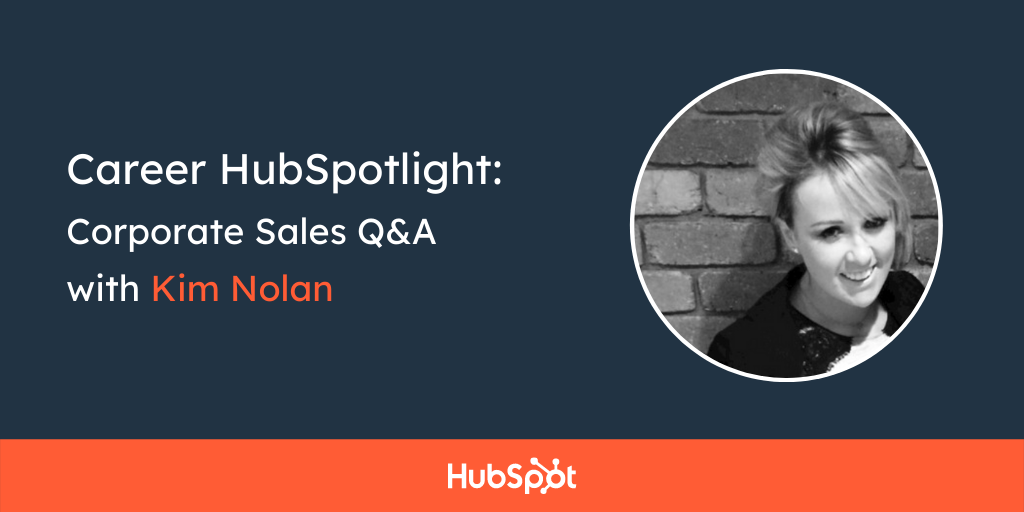

This week marks the one year anniversary of starting my first-ever sales job. I spent the 10 years prior as an out-and out-marketer. I went from buying HubSpot as a customer, to implementing it at that company, to then joining HubSpot as a Channel Consultant. A year later, I was looking for a new challenge and started talking to my managers about the world of sales.
To be honest, I was very hesitant when I first started talking about moving to HubSpot's sales team. While I had always been involved in sales channels, managed sales teams and even worked on some pretty large deals in my previous HubSpot life, I had never carried individual contributors quota. That part really scared me. I was worried I didn’t have the skills necessary to succeed, that I would quickly be exposed as an imposter in a fast-paced sales environment. The reality is, HubSpot has one of the best trained salesforces I’ve ever worked with so from the outside looking in, it seemed like a terrible idea for me to dive in with little sales experience. (This was quickly affirmed by my girlfriend and family members I spoke to.)
The general consensus was that I was an idiot (in fairness they had some good data points to refer to) and that this was a disaster in the making. However, after some pretty deep personal reflection on why I joined HubSpot in the first place and some positive encouragement from two of our top-performing salespeople, Sharen and Steve, I decided to walk the plank and join the UK & Ireland Agency Partner team.
Now, 12 months later, I not only survived but am growing my sales career and impact on the business quickly. A year in and I’ve hit well north of 100% of my quota. I also got to be the MC at HubSpot’s EMEA Partner Day here in Dublin (where I mildly insulted our CEO Brian Halligan and lived to tell the tale), and run the Agency Partner track at our Grow with HubSpot event in London.
These are six key actions I took that I believe helped me get here, and hopefully if you’re just starting out as a quota-carrying rep, they can help do the same for you.
1. I read every single sales book I could find. I found that in commonality there is often truth, and you tend to find some pretty consistent themes in sales skills books whether they were written in the 1920’s or in 2017. I took what I felt were the key takeaways from the following books:
- How To Win friends and Influence People - Dale Carnegie
- Challenger Sale - Matthew Dixon
- To Sell is Human - Daniel Pink
- Pitch Anything - Oren Klaff
- Influence- The Psychology of Persuasion - Robert Cialdini
- Cold Calling Techniques - Stephan Schiffman
- Secrets of Question Based Selling - Thomas Freese
- Go For No - Richard Fenton
- Straight Line Theory - Jordan Belfort (Youtube Series)
I still consume any new sales material I can find but one piece stands out amongst all others and runs through the text of every one of the above is a simple idea: Solve for the customer.
This is not rocket science. Simply ask intelligent questions of your prospects to understand what they want and what their problem is. Then be honest as to whether you can solve that problem for them or not. Using this very simple principle will remove the need for any sort of sales tricks from any opportunity. If they need your help and you can clearly show how you can help them achieve their goals the majority of your prospects will buy. It can really be that simple.
2. I set mini goals to solve for bigger goals. My biggest concern was obviously hitting target. This is the sort of thing that keeps me up at night so I needed to figure out a way that my target (at full quota) would never be in doubt. I decided that instead of 100%, I wanted to solve for 200% no matter what. So if I even hit 50% of my personal target I would always hit my full number at worst.
The first target I set was to close a deal every week at a certain revenue goal. I treated and still treat every Friday like it’s the end of the month and focus on prioritizing at least two opps that stand out as best fits. To be honest this was key for me. While the odd time I missed a weekly goal, the majority of the time I hit and this lead to me never having to worry a monthly target.
My end of month was every week.
In order to solve for a weekly closing cadence I knew I needed a strong pipeline with solid opportunities. The minimum I accepted from myself each day was 2 new opportunities where the owners of the agency were involved. I sat down and made clear plans with the BDRs I worked with and they did an excellent job at hitting the weekly opportunity creation targets we set.
After month one when I hit well above my number, I knew I was moving in the right direction.
3. I leveraged the talent all around me. Everyone in your team is talented otherwise they wouldn’t be there. The great HubSpotter Steve Vaughn once told me when he wants to learn anything, he figures out who is best at it and sets up time with that person.
I spent time understanding who in my team and outside my team were best at prospecting, discovery calls, demos, closing and forecasting. I took the best of what I could get my hands on and made it my own. I did not need to re-invent the wheel and within two weeks I felt I had a strong handle on each part of the sales process because I was using proven elements from successful colleagues.
4. I knew that I had the best product on the market. This is something that I had 100% confidence in. Our product and engineering team has done an incredible job creating some pretty outstanding software. The advantage I had coming from a marketing customer background (and a user of multiple different types of marketing software) is that I knew exactly what we have under the hood and just how good it is. I never ever went into a call where we were in a competitive situation with any fear. Our product solves at a level for marketing teams (and now sales teams) that I truly believe is unmatched.
5. I promised myself no matter what happened and I would remain adaptable and just deal with it. The past 12 months brought three role changes and some big internal changes to the structure of our sales team and how we sell HubSpot. And while at the expense of my manager’s mental health at times, we just pushed through. Sometimes, when you are dealing with unexpected or even expected change we have a natural inclination to work against it.
My advice here is to trust the direction the company’s moving in. We have a lot of smart people working at HubSpot and we are all on the same mission. Decisions are not made lightly and while it may result in some short term pain for us as individuals at times, ultimately as a company we’ll all end up in a better place.
Everyone (including me) wants things to stay the same but yet get better. Adapt and roll with it.
6. And lastly, remember that you are selling more than software. Another huge advantage I had coming into sales was a deep understanding of our servicing model. The value of HubSpot really comes from the people working with our customers every day like account managers, customer success managers, and our amazing support reps.
Know that all software is absolutely and utterly useless without the correct inputs (something I learned the hard way as a marketer). The biggest value our services team brings is their precise understanding of what those inputs should be. This is what helps our customers see results.
If as a salesperson you don’t understand how to sell the value of your services teams, I suggest you set up time with somebody who can help you better position this to prospects. (And if you don’t have a strong services team at your company, well, we’re hiring.)
A big shout out to my team for all of their help so far. Who knows what each month is going to bring, but I do know that if you keep setting mini goals and hitting them, the bigger goals will take care of themselves.
Sales Career Growth









